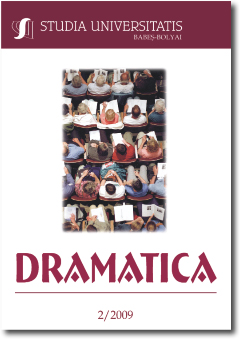KANTOR ET L’URGENCE DU PRÉSENT. LA PRÉ-EXISTENCE SCÉNIQUE COMME MODALITÉ DE RÉSISTANCE À LA RÉACTION ESTHÉTIQUE
KANTOR AND THE URGENCY OF THE PRESENT. STAGE PRE-EXISTENCE AS MODE OF RESISTANCE AGAINST AESTHETIC REACTION
Author(s): Benjamin AbitanSubject(s): Theatre, Dance, Performing Arts
Published by: Studia Universitatis Babes-Bolyai
Keywords: Tadeusz Kantor; legacy; France; young theatre companies; esthetic reaction; autonomy of the stage; theatrical pre-existence; legitimacy of art; politicization; subversion; function of art; post-dramatic theatre; avant-garde; actor; illusion.
Summary/Abstract: Kantor and the Urgency of the Present. Stage Pre-existence as Mode of Resistance Against Aesthetic Reaction. In France, it is generally accepted that Kantor left no legacy. However, we are currently witnessing a renewed interest in his work amongst younger artists. This can partly be explained as the need to break away from a certain reactionary climate in terms of aesthetics, which is visible notably throug: - the existence of a general defiance against the autonomy of the stage, therefore implying a need to work on supposedly “legitimate” themes; - the explicit political position of the artist as a prerequisite to subsidized creation. The opposition stated here does not come from a generational conflict, but rather a dichotomy that positions French theatre between a theatre of representation, which is the largely dominant pole, and a theatre of presence, of which Kantor contributed to open up the way. There are in France, therefore, two opposing visions of the actor, seen either as having a proficiency that is summoned from a “neutral” state, or as a real presence that comes before all fictional construction; likewise, there are two ways of considering the separating line between the stage and the public, either as a threshold that calls to fraternize or as an unassailable barrier. This point of view is not that of a researcher, but rather one of a practitioner, educated at university and then at the Conservatory in the 2000’s and who, therefore, knows Kantor’s work only from its traces.
Journal: Studia Universitatis Babes-Bolyai - Dramatica
- Issue Year: 2012
- Issue No: 1
- Page Range: 115-126
- Page Count: 12
- Language: French

